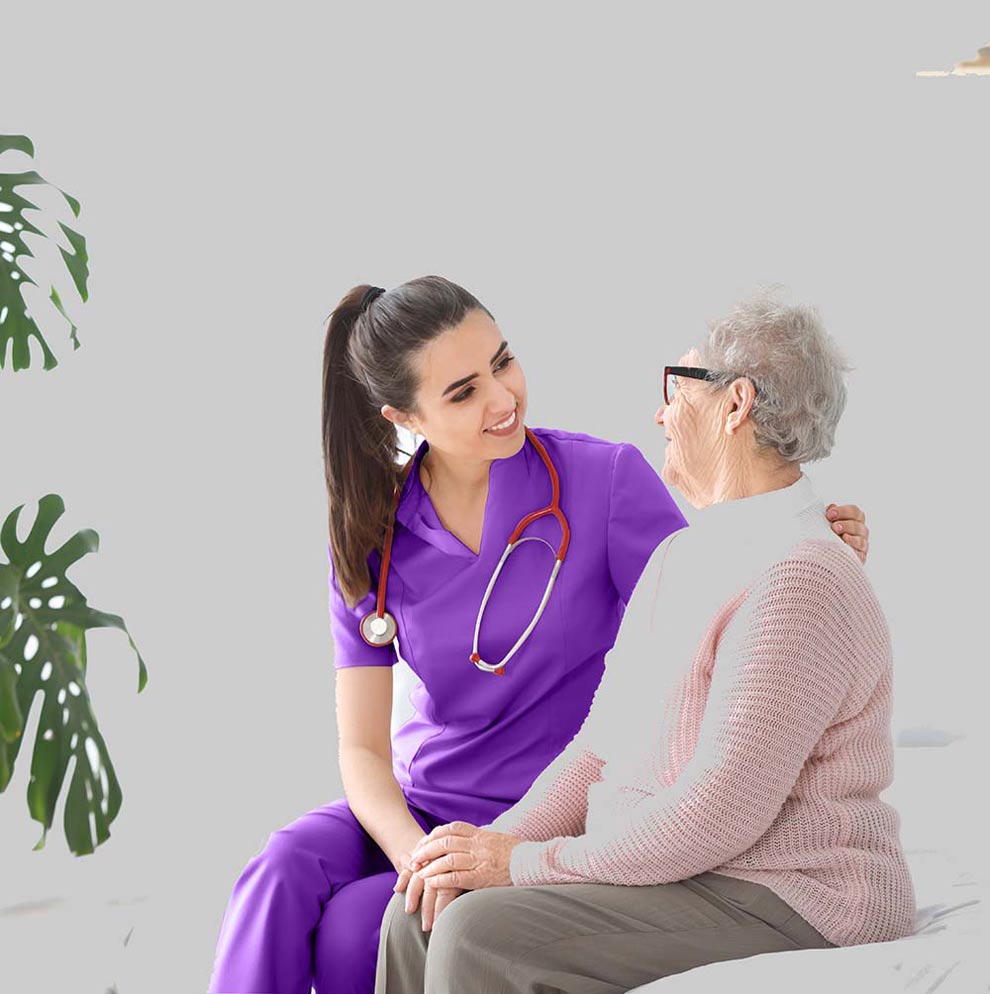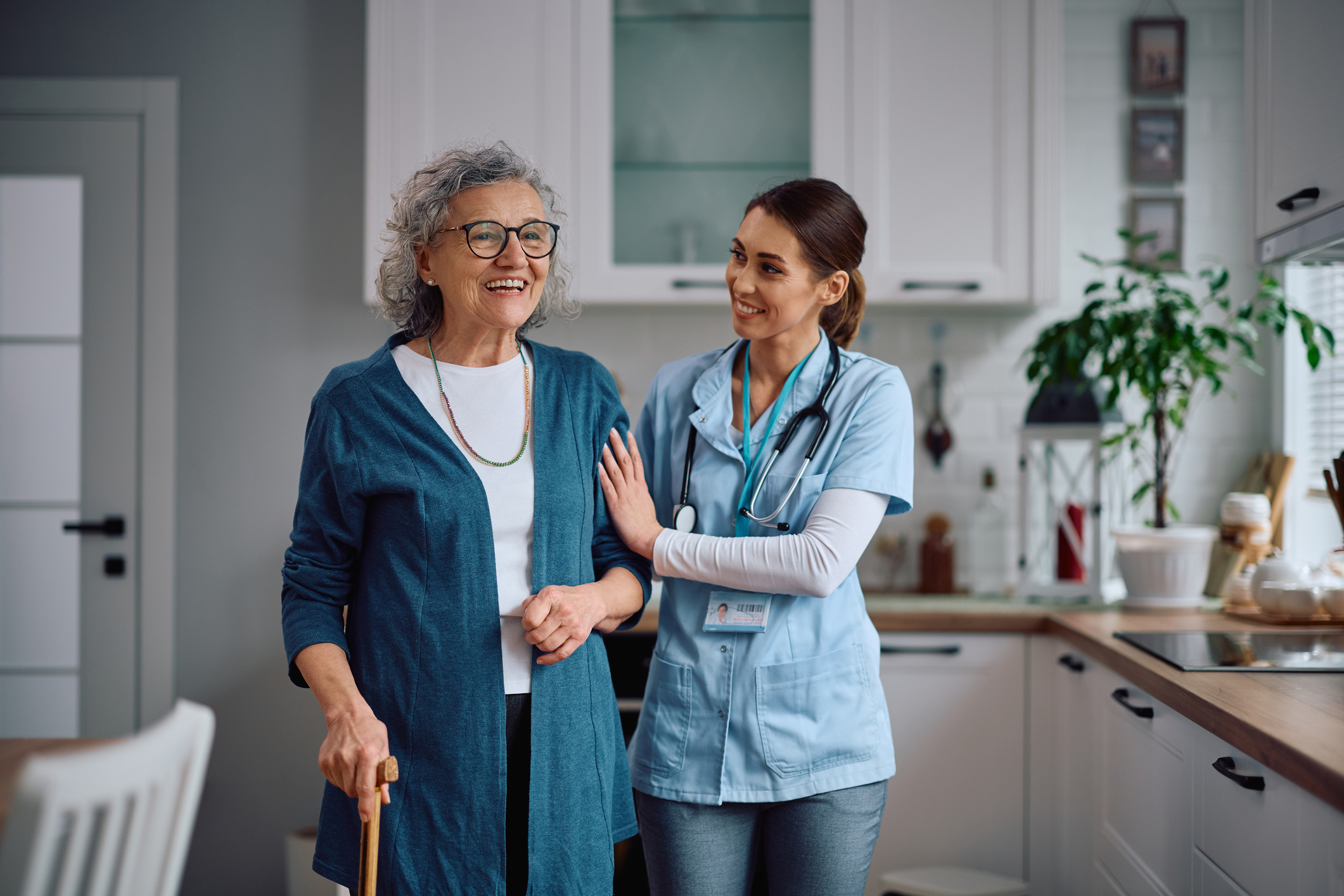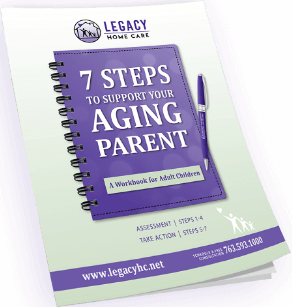Understanding Home Health Care
Home health care refers to a wide range of services in an individual’s residence. Doctors usually prescribe it, and providers tailor plans to the client’s needs.
Generally, home health care allows older adults to receive high-quality support without losing independence or leaving the familiarity and comfort of home. What are some of the most common services families get for their aging loved ones?
- Doctor and Nursing Visits: Physicians may visit patients at home to diagnose or treat illnesses, and registered nurses handle wound care, medications, and vital signs monitoring.
- Physical, Occupational, and Speech Therapy: Patients who require therapy to regain strength or functionality rely on physical therapists for mobility and pain, occupational therapists for everyday chores, and speech therapists for communication.
- Home Health Aides: Aides step in when there are personal care needs, such as getting out of bed, moving around, bathing, and grooming. They often work with a nurse to maintain day-to-day quality of life.
- Medical Social Services: Social workers help patients and families navigate situations involving multiple health providers or long-term conditions — they share community resources and coordinate services.
- Companionship and Homemaker Services: For seniors who live alone, companionship makes a big difference in emotional well-being. Caregivers join them in grocery shopping and other chores or take over the cooking and cleaning.
24/7 Home Health Care
Home health care does not look the same for everyone. Some care services may only involve scheduled visits a few times a week, while others require longer daily or nightly shifts. Depending on what you’re dealing with, there is a program to back you up.
As a person’s needs become more complex, 24-hour care becomes essential. However, it is often unrealistic to be a full-time caregiver, especially if you are juggling work, children, and other responsibilities. Fortunately, many home health care providers are eager to be of service.
In-home care 24/7 in Minneapolis, MN, means having someone present and alert at all times — day or night. How does it work?
Two or more caregivers rotate shifts for continuous supervision, guaranteeing your loved one is always looked after. This type of care delivers personalized attention, reducing the risk of mishaps. Count on trained caregivers to prioritize professionalism and dignity, letting you focus on quality moments with your family instead of struggling together.
When To Consider In-Home Care 24/7 in Minneapolis, MN?
Certain signs and situations indicate you might demand more than just part-time help. Here are some of them.
Recent Hospital Discharge
When you return from a hospital stay, the transition period is delicate. There are chances of medication mismanagement, infections, or physical strain, all requiring professional oversight. Do not delay or reverse recovery; a caregiver ensures you follow all instructions and promptly address emergencies.
Use of Assistive Equipment
Does your loved one heavily depend on devices like walkers, wheelchairs, or stair lifts? Know that improper use of these tools is dangerous. If no one else is around, they could fall, trip, or hurt themself. Continuous care means someone is always ready to check on them without making them feel incapable.
Frequent Falls
Did you know that falls are the leading cause of injury for older adults? Even just one fall can have lasting consequences, like hip fractures, head injuries, or a complete loss of independence. If your parent or grandparent has unexplained bruises or reports repeated accidents, never leave them to move on their own.
Incontinence
Unmanaged incontinence results in more than just embarrassment — it causes skin infections, sores, and urinary tract issues. When seniors cannot make it to the bathroom in time, they need quick, discreet support. Make hygiene maintenance effective and respectful.
Memory Loss
Alzheimer’s and other forms of dementia leave individuals vulnerable to wandering, missing medications, or forgetting essential tasks. As such, 24/7 caregivers provide gentle, structured guidance.
Disrupted Sleep
Some seniors experience restlessness, confusion, or agitation during the night. Without overnight care, they may get up and move around. An awake caregiver may soothe, redirect, or physically assist as needed.
Emotional Distress or Loneliness
Social isolation has been linked to depression, cognitive decline, and poor physical outcomes. Simply put, loneliness is harmful to health. A full-time caregiver provides regular interaction and emotional support, dramatically improving mood and quality of life.
Caregiver Burnout
Family caregivers give so much of themselves that their own well-being suffers. Stress, sleep loss, and exhaustion make it hard to deliver consistent, quality care. Professionals relieve the burden, enabling families to rest and recharge while keeping their loved ones safe and comfortable.
Get 24hr Care at Home in Minneapolis, MN
“Is there 24/7 home health care near me?”
With Legacy Home Care, yes.
Our team of experienced registered nurses, licensed therapists, compassionate social workers, and professional home health aides serves families across 21 counties in the state. We believe choosing 24hr care at home in Minneapolis, MN, is choosing the life of everyone involved.
Let’s talk about the care your loved one and family deserve. Call Legacy Home Care at (763) 593-1000 or contact us online today.




How To Get Home Health Care for Elderly Loved Ones: A Step-by-Step Guide
Step 1: Check What Care Your Loved One Needs Start…